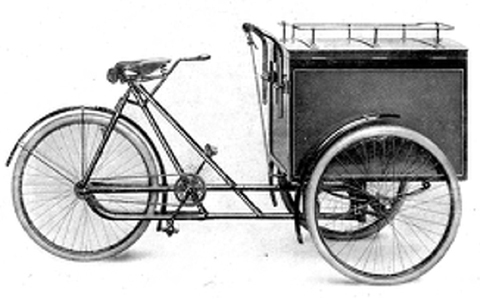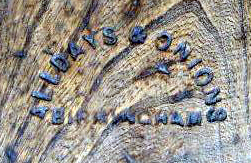
Keere Street, also known as Scare Hill, is the cobbled street that drops sharply downhill from the High Street towards Southover. It lies just outside the old town wall, which forms the boundary for properties on the eastern side of the street. Most of the properties are Grade II listed, dating from the late 18th or 19th century, with a few exceptions at the southern end of the street. It is famous for the doubtful legend that the Prince of Wales (future George IV) once drove a coach and four down the street to reach Southover Grange.
With over 1400 pages on the Online Bicycle Museum website, and more than 250,000 photos uploaded during the past ten years, some time ago I started running out of new locations for my photoshoots. Regular subscribers will appreciate that no modern cars have ever crept into the photo backgrounds, nor buildings newer than the featured machines. But it becomes a challenge finding a new spot to shoot. I’ve used the top of Keere St, Lewes, before, but this is the first time I’ve explored the opportunities offered by the lower end of this historic thoroughfare.

1910s Alldays ‘Standard’ Carrier Tricycle
26″ Wheels
LENGTH: 82″
WIDTH: 30″
HEIGHT: 42″






THE IMPROVED ALLDAYS CARRIER BOX TRICYCLE

At the 1910 National Cycle Show, Alldays & Onions introduced an improved version of their Imperial Matchless Roadster bicycle, as well as this new box carrier using the innovations in their 1909 patent number 3454, below.

As you can see by comparing this tricycle with the original design in the 1900 catalogue further down the page (and an interim version the 1908 photo below), the main frame was considerably strengthened, and an extra vertical tube was added. It also featured an improved front axle and steering mechanism, so that it was able to carry heavier loads.


WATSON PRICKARD LTD

This Alldays Delivery Tricycle was commissioned by a firm of Gent’s Outfitters Watson Prickard Ltd of 16 North John St, Liverpool. Though the company subsequently moved premises, the Watson Prickard Building still exists at this address.
I found some old laundry boxes in the Alldays, so I assume that one of its duties involved delivering dry cleaning. Most carrier tricycles of this era were front opening with rails on the top of the carrier box for attaching extra cargo. However this one has a hinged lid, which illustrates that it is a model designed to be used for lightweight deliveries.




The industrial tricycle was developed in England in the 1870s. It was commonly used by grocers, bakers, druggists and other tradesmen.
By 1939, in London, there were 4,000 ice cream tricycles. Delivery tricycles are still used all over the world, but especially in Asia where they can carry loads of up to 1,000 pounds.
Companies such as Alldays & Onions made a standard carrier tricycle, but would also adapt the delivery box according to a customers needs.




1920 ALLDAYS BICYCLE CATALOGUE
Alldays & Onions Ltd
Great Western Works, Birmingham














Alldays & Onions Ltd History

The company was founded by a family of craftsmen named Onions who manufactured bellows in their shed in the shadow of Dudley Castle. This was in 1650, during the reign of King James the First.

By 1770 the company was trading under the name J C Onions and, having established a virtual monopoly in and around Birmingham, the company soon began manufacturing portable forges in addition to bellows. During the 19th century the company was appointed bellow makers to her Majesty’s ordinance and increased production, supplying forges and bellows to the new British colonies abroad.

In 1885 a merger with a local rival manufacturer William Alldays saw the foundation of a new company, Alldays & Onions Ltd and advances in technology allowed the company to expand into new areas of production including water turbines, centrifugal fans, positive pressure blowers, pneumatic hammers, cupolas, furnaces, smithy equipment and a huge range of cycles and tricycles.

Cycles were made under the name ‘Alldays Cycles.’ They started making cars in Birmingham in 1898, and motorcycles in 1903 at their Great Western Works. When WW1 ended the company produced the Enfield-Alldays series LC, but in due course vehicle production ceased and the company looked to different products for survival.

After World War II, with changing market requirements, Alldays & Onions Ltd establish itself as a market leader in the manufacture of centrifugal fans expanding into the field of dust collecting and chemical engineering. In 1969 the company merged with rival fan company J.C.Peacock forming Alldays Peacock & Co Ltd and in the 1980s the company expanded its factory in Weston-Super-Mare in Somerset and began selling abroad. In 2005 Alldays Peacock was purchased by the world’s leading fan-maker, the German-based Witt Group and became part of Witt UK; manufacturing moved to Halifax, West Yorkshire.
Though they no longer make bicycles, it’s refreshing to see that this manufacturing company has survived, with various mergers and changes, for around 360 years.

UPDATE 12th March 2009: When I saw the above badge advertised for sale on ebay, I did an internet search for Onions Equipment and came up with the brochure below, which appears to show that either Onions had merged at some time with Vickers, or that Vickers manufactured and/or marketed equipment for which Onions had the patent.















1900 ALLDAYS CATALOGUE
These pictures are from the 1900 Alldays catalogue. You can see the earlier design of the carrier tricycle, and compare it with the subsequent design of carrier tricycle, patented in 1909.










1920 ALLDAYS & ONIONS LOW GRAVITY TRADESMAN’S BICYCLE

To see pictures and details of this bicycle
PLEASE CLICK HERE




Keere St, Lewes, thanks to – https://leweshistory.org.uk/projects/the-lewes-street-stories-initiative/lewes-street-stories-keere-street/




























































